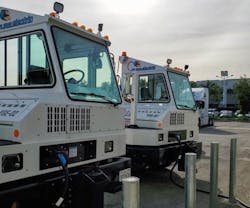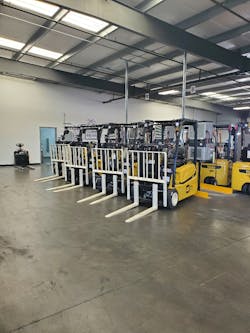Fleet feedback from electric truck adoption
At the end of June, the California Resource Board (CARB) announced its intention to address emissions by taking steps to completely phase out Class 2 through Class 8 diesel truck operation in the state by 2045. The Advanced Clean Trucks regulations are designed to incrementally increase the adoption of zero-emission commercial vehicles in the state. Starting in 2024, vehicle manufacturers will have limitations on the number of diesel-powered commercial vehicles they can sell.
Truck manufacturers like Volvo have already been heavily involved in the creation of zero-emission commercial vehicle technology. Earlier this year during a trip to the Inland Empire of Southern California, I attended the Volvo LIGHTS program where Volvo introduced its full battery-electric VNR Class 8 tractor and showcased a holistic approach to the implementation and adoption of battery-electric commercial trucks for fleets.
Since that initial introduction, the initial program, and truck introduction, a few fleets have looked to test out the program in the real world.
Getting infrastructure in place
I recently followed up with Troy Musgrave, director of process improvement for Dependable Highway Express, to learn more about what his fleet has done to prepare for the upcoming implementation of electric vehicles. Dependable Highway Express is an asset-based, less-than-truckload (LTL) carrier with primary locations and service centers in California, Arizona, and Nevada. Musgrave advises Dependable plans to have a total of 10 battery electric box truck and three Class 8 tractor Volvo VNRs added to its fleet in the next three to five years. To start, the fleet will pilot three Volvo eVNRs – one box truck and two tractors – over the next six months.
Dependable also has two Orange EV battery electric yard tractors, which are already in operation. Plus, the fleet just switched out its 14 propane forklifts for fully electric ones as well.As part of the implementation of charging infrastructure for Dependable’s Ontario, California, location, Musgrave confirms that the process has taken longer than expected due to the unknowns of charging station installation requirements for commercial vehicles.
“It wasn't like we could just look at this project at the beginning and say, ‘We know exactly who we have to talk to first,’” Musgrave says. “It was a lot of ‘Hey, go down this road and then find out that you’ve got a little bit of a barrier here, you’re going to have to back up and turn around and go this other direction first.’ … There's a sequential aspect to making sure that all the contracts are completed in an order that will allow [the process] to keep moving forward.”
This included understanding different city, county, and state requirements, agreements, and approval processes, Musgrave says. Not only that, but contracts for different zoning requirements or installation of conduit, for example, require separate contracts that may be contingent upon one another to ensure proper legality and safety of installation.
The positive outcome, however, is that Musgrave expects the hurdles his team has managed to smooth out will create a better-defined roadmap for other Dependable facilities and for other fleets going forward.
“The timelines projected to get all this stuff organized and done has been a real eye opener,” Musgrave says. “Going to the next facility, we have a lot of lessons learned. I know I would approach it in a very different way next time.”
Musgrave confirms the six charging stations are now set to receive power by the end of July, so the fleet can begin to use the electric forklifts and the additional Volvo trucks once they arrive.
Maintenance for EV trucks
Full battery electric vehicles inherently have fewer moving parts and systems. This equates to less chance of vehicle downtime due to system issues or breakdowns. Volvo discussed its plan for implementing maintenance, service, and training for electric trucks during the Volvo LIGHTS event.
While the Volvo eVNR trucks are not yet in operation at Dependable, Musgrave shares that he’s appreciated the ease with which monitoring the Orange EV terminal tractors has been.
“One of the great things about the Orange EV tractors is there’s a website and basically it takes me two seconds to go to the website every morning and [the website] tells me if there are any alerts that the tractor needs attention,” Musgrave says.
He provided the example of an alert to the specific tire location registering with low tire pressure.
“Without even going out to look at the truck, you can sit at your desk and see that there's a problem and then go take care of it,” he says. “You don't have to wait for somebody to report it or not report it.”
He advises that a designated technician at Dependable currently works with an Orange EV technician to learn about how to monitor and service the terminal tractors. The Orange EV tractors are under warranty currently, but Musgrave notes the fleet is considering handling the maintenance on the vehicles once the warranty ends.
Dependable’s technicians will have some training to manage maintenance and service for the eVNR trucks, but the fleet will work with the dealership service facility as well.
For traditional diesel trucks in Dependable’s fleet, Musgrave confirms much of the maintenance work is contracted through the western Mack/Volvo dealership network TEC Equipment. He expects that will continue with the Volvo electric trucks as well.
Musgrave anticipates the maintenance and upkeep for the eVNR electric trucks will be similar to the fleet’s existing Volvo truck monitoring through Volvo’s Uptime Center.
While not without headaches or hurdles, overall, a proactive approach like the process undertaken by Dependable can help address challenges with regulations head-on.
About the Author
Erica Schueller
Media Relations Manager | Navistar
Erica Schueller is the Media Relations Manager for Navistar.
Before joining Navistar, Schueller served as Editorial Director of the Endeavor Commercial Vehicle Group. The commercial vehicle group includes the following brands: American Trucker, Bulk Transporter, Fleet Maintenance, FleetOwner, Refrigerated Transporter, and Trailer/Body Builders brands.
An award-winning journalist, Schueller has reported and written about the vehicle maintenance and repair industry her entire career. She has received accolades for her reporting and editing in the commercial and automotive vehicle fields by the Truck Writers of North America (TWNA), the International Automotive Media Competition (IAMC), the Folio: Eddie & Ozzie Awards and the American Society of Business Publication Editors (ASBPE) Azbee Awards.
Schueller has received recognition among her publishing industry peers as a recipient of the 2014 Folio Top Women in Media Rising Stars award, acknowledging her accomplishments of digital content management and assistance with improving the print and digital products in the Vehicle Repair Group. She was also named one Women in Trucking’s 2018 Top Women in Transportation to Watch.
She is an active member of a number of industry groups, including the American Trucking Associations' (ATA) Technology & Maintenance Council (TMC), the Auto Care Association's Young Auto Care Networking Group, GenNext, and Women in Trucking.
In December 2018, Schueller graduated at the top of her class from the Waukesha County Technical College's 10-week professional truck driving program, earning her Class A commercial driver's license (CDL).
She has worked in the vehicle repair and maintenance industry since 2008.


